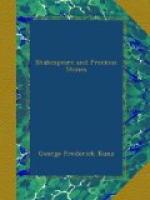My daughter! O my ducats!
O my daughter!
Fled with a Christian! O my Christian ducats!
Justice! the law! my ducats and my daughter!
A sealed bag, two sealed bags of ducats,
Of double ducats, stolen from me by my daughter!
And jewels, two stones, two rich and precious
stones,
Stolen by my daughter! Justice! find the
girl;
She hath the stones upon her, and the ducats.
Merchant of Venice, Act ii,
sc. 8, l. 15-22.
“Comedies”, p. 171,
col. B, lines 23-30.
I would my daughter were dead
at my foot, and the
jewels in her ear!
Merchant of Venice, Act iii,
sc. 1, l. 92.
“Comedies”, p.
173, col. B, lines 1, 2.
Sweet are the uses of adversity,
Which, like the toad, ugly and venomous,
Wears yet a precious jewel in his head.
As You Like It, Act ii,
sc. 1, l. 13-15.
“Comedies”, p. 190,
col. A, lines 10-12.
Win her with gifts, if she respect
not words:
Dumb jewels often in their silent kind
More than quick words do move a woman’s
mind.
Two Gentlemen of Verona, Act iii,
sc. 1, l. 89-91.
“Comedies”, p.
29, col. A, lines 63-65.
I frown the while; and perchance
wind up my watch,
or play with my—some rich jewel.
Twelfth Night, Act ii,
sc. 5, l. 64-66.
“Comedies”, p. 263,
col. B, lines 32, 33.
A jewel in a ten-times-barr’d-up
chest
Is a bold spirit in a loyal breast.
King Richard II, Act i, sc.
1, l. 180, 181.
“Histories”, p. 24,
col. B, lines 28, 29.
This royal throne of Kings, this scepter’d isle,
This earth of majesty, this seat of Mars,
This other Eden, demi-paradise,
This fortress built by Nature for herself
Against infection and the hand of war,
This happy breed of men, this little world,
This precious stone set in the silver sea,
Which serves it in the office of a wall
Or as a moat defensive to a house,
Against the envy of less happier lands,
This blessed plot, this earth, this realm, this England.
King Richard II, Act ii, sc. 1, l. 40-46.
“Histories”, p. 28, col. B, lines 17-23.
In argument and proof of which
contract,
Bear her this jewel, pledge of my affection.
I Henry VI, Act v,
sc. 2, l. 46, 47.
“Histories”, p.
115, col. A, lines 8, 9.
It seems she hangs upon the cheek
of night,
Like a rich jewel in an Ethiop’s ear;
Beauty too rich for use, for earth too dear.
Romeo and Juliet, Act i,
sc. 5, l. 47-49.
“Tragedies”, p.
57, col. B, lines 59-61.
But chiefly to take thence from
her dead finger
A precious ring, a ring that I must use
In dear employment.
Romeo and Juliet, Act v,
sc. 3, l. 30-32.
“Tragedies”, p.
75, col. A, lines 34-36.
A striking proof that Shakespeare had no fear of tautology when he wished to strengthen the impression of a word by constant reiteration is given in the Merchant of Venice (Act v, sc. 2), whence we have already quoted a few lines. The passage concerns the disposal by Bassanio of a ring he had received from Portia, and he answers her thus in the First Folio text:[34]




